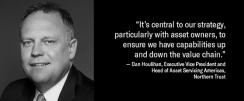In an environment of high fees for active management strategies and shifting regulatory requirements, many asset owners globally have chosen to manage their investments in-house in order to squeeze cost and process efficiencies out of the investment process, and to maintain greater control of it. Other asset owners are considering doing the same.
This worldwide trend toward managing assets in-house has been accompanied by a desire to pursue increasingly sophisticated investment strategies. Such strategies, however, often depend upon leveraging the leading edge of technology and expertise that might not exist on an in-house team. In short, in-house investment management teams can spend a disproportionate amount of time trying to keep up on the operational side, often at the cost of time spent on areas of the process where they truly add value – investment management, preservation of capital, and driving returns.
“You can build an infrastructure and an operating model for your current state, but as the world continues to evolve and different asset classes become attractive, you may or may not have the intellectual capital or technology capability for new investment strategies,” says Dan Houlihan, a contributor to a new whitepaper on the changing asset owner model, and Executive Vice President and Head of Asset Servicing Americas, at Northern Trust.
The building blocks for an effective operational model
Which are the most important priorities for investment operations? And even if investment decision-making is done in-house, must the operational aspects be as well? Houlihan cites three essential pillars for constructing the operational side of what can be viewed as the new asset owner model: governance, talent, and technology.
“First and foremost, governance needs to be put in place, to execute on the investment strategy in line with objectives. That involves clear roles and responsibilities, as well as segregation of duties,” Houlihan says. Good governance also calls for clear strategic objectives, and a robust risk management framework. Furthermore, asset owners should rigorously assess themselves in a constant exercise of self-review, just as they would with outside managers. They might ask if they are doing a better job than an external manager. What are their benchmarks and performance metrics? How do they monitor, measure, and report on their approach and risk management? Ultimately, when you get right down to it, would they fire themselves as a manager if they weren’t confident they were delivering on the investment value?
Secondly, the operating structure must be underpinned by the right people and talent. This can be a burden in a constantly shifting investment environment, particularly when relationships, communication, and the service ethos of those involved is integral to the model. Houlihan explains the core philosophy behind the holistic operational solutions offered by Northern Trust “is to be an extension of our client’s business. Whether for trading or middle-office functions, we engage with our clients face-to-face as much as practicable. We are committed to establishing relationships with dedicated, named individuals, such as between traders and portfolio managers.”
The third piece is to identify the underlying technologies needed. “They may be for activities like performance measurement, order management, portfolio accounting or data management, or the implementation of all these functions,” says Houlihan. He compares those in-house technology requirements with an outsourced operations solution: “The time to market and the upfront capital would logically be longer term and more expensive in-house.”

Additional strength in flexibility
Another benefit of partnering with an operations service provider is that in-house investment teams are imbued with the agility to execute faster in any jurisdiction or for any asset class. “That’s a key decision point for asset owners to think about when assessing their operational model,” Houlihan says.
In addition to flexibility, operational efficiencies are necessary to achieve the greater control of the investment strategy and its underlying securities – a primary reason for having the investment team in-house. Those efficiencies often hinge on having access to the data when it’s needed the most, and delivering and receiving it organized in a customized, useful form.
As for cost efficiencies, while asset owners obviously hope to reduce total long-term expenditures associated with technology and regulatory spend, “it may be difficult to forecast what new fixed costs are likely to be over a three-to-five-year period. That’s where Northern Trust can help clients with making decisions around their operational needs,” says Houlihan.
A complex infrastructure needs to support a typical breadth of asset classes for a myriad of daily processes. “It’s central to our strategy, particularly with asset owners, to ensure we have capabilities up and down the value chain,” says Houlihan. He considers that value chain, ranging from back to front office, to suggest examples of operational issues. Back-office custody is still usually outsourced. Then comes fund accounting and investor servicing, followed by middle and front offices.
The trend of front office outsourcing has recently gained steam. For example, there has been a rapidly emerging trend to outsource the entire trading function, not just the execution of trades. Northern Trust’s Integrated Trading Solutions (ITS) can allow an asset owner to move trading to them. ITS can be combined with an investment book of record on Omnium, a platform suitable for public securities and derivatives.
Northern Trust also recently launched Front Office Solutions, a front and middle office capability for complex, multi-asset portfolios. The product amalgamates investment data and customer relationship management with a sophisticated analytics pack that provides dashboards at the CIO level.
“We’ve created an unprecedented solution that incorporates what is typically today done in four or five different systems into one,” says Houlihan. “Asset owners that are managing their assets in-house typically have a data management solution, a research management solution, and a performance and analytics solution. We’ve packaged that all into one, with the differentiator that we’re not only providing the technology, but also the service wrapper around it to support and maintain the data on a monthly basis. As a result, the CIO has very clean data, but also has a set of tools to be able to evaluate it in a way that’s useful to make decisions.”
© 2019 Northern Trust Corporation. Head Office: 50 South La Salle Street, Chicago, Illinois 60603 U.S.A. Incorporated with limited liability in the U.S. Products and services provided by subsidiaries of Northern Trust Corporation may vary in different markets and are offered in accordance with local regulation. This material is directed to professional clients only and is not intended for retail clients. For Asia-Pacific markets, it is directed to expert, institutional, professional and wholesale investors only and should not be relied upon by retail clients or investors. For legal and regulatory information about our offices and legal entities, visitnortherntrust.com/disclosures. The following information is provided to comply with local disclosure requirements: The Northern Trust Company, London Branch; Northern Trust Global Investments Limited; Northern Trust Securities LLP. Northern Trust Global Services SE, 6 rue Lou Hemmer, L-1748 Senningerberg, Grand-Duché de Luxembourg RCS B232281; Northern Trust Global Services SE UK Branch, 50 Bank Street, London E14 5 NT; Northern Trust Global Services SE, Abu Dhabi Branch, registration Number 000000519 licenced by ADGM under FSRA # 160018. The Northern Trust Company of Saudi Arabia - a Saudi closed joint stock company - Capital SAR 52 million. Licensed by the Capital Market Authority - License No. 12163-26 - C.R: 1010366439. Northern Trust Luxembourg Management Company S.A., 6 rue Lou Hemmer, L-1748 Senningerberg, Grand-Duché de Luxembourg, Société anonyme RCS B99167. Northern Trust (Guernsey) Limited (2651)/Northern Trust Fiduciary.




